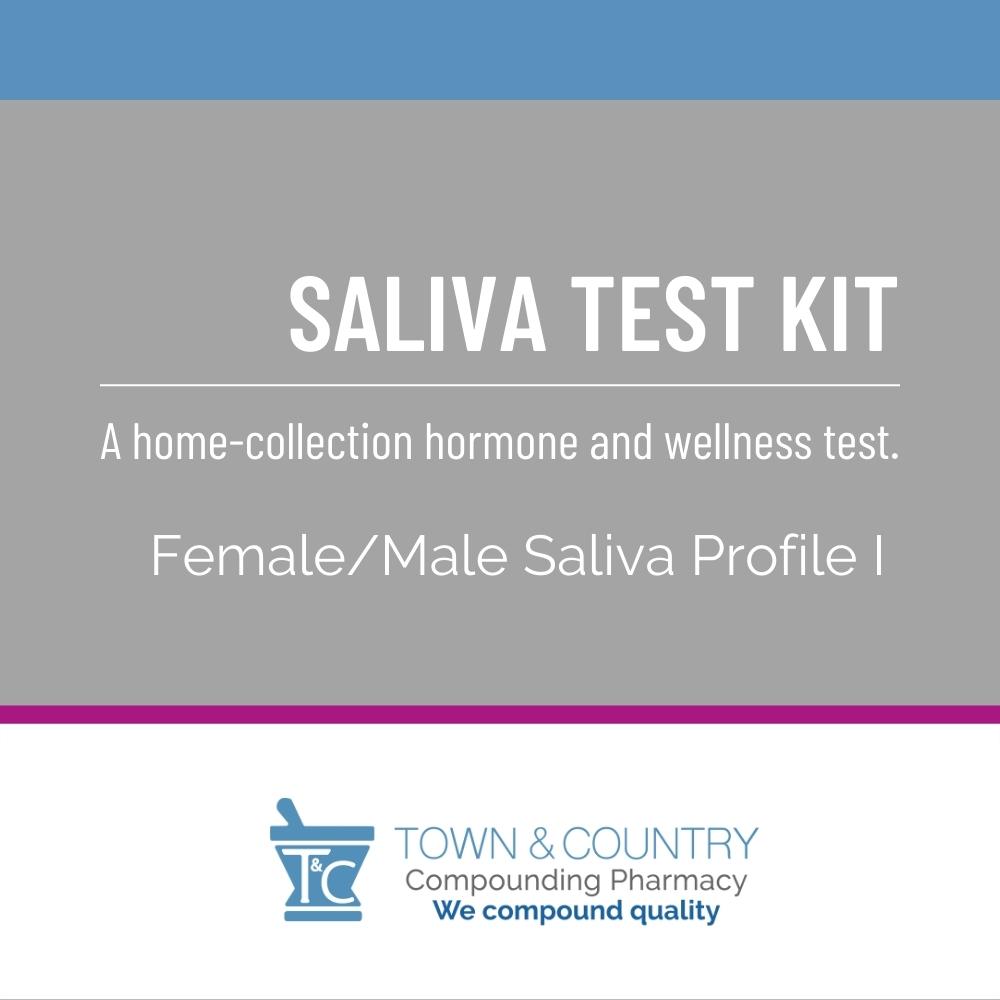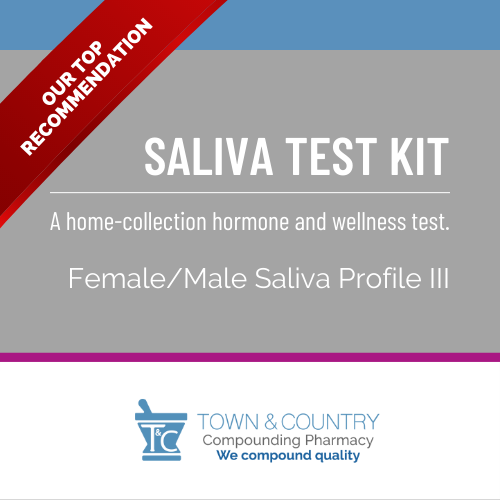
Addressing Hormone Imbalance
As women approach menopause, specific symptoms often suggest hormone imbalance. Some are affected by these imbalances much more than others, and their quality of life is compromised. Awareness of their symptoms and how they may be tied to their hormone levels can give women the knowledge to have conversations with their practitioners.

About Saliva Testing
A prescription is not required for a hormone saliva testing kit. Saliva testing has gained popularity among practitioners of integrative and functional medicine. It is a non-invasive collection method where patients collect their saliva in plastic tubes to measure hormones like cortisol, estrogen, progesterone, DHEA sulfate, and testosterone. Saliva is an excellent way to assess hormone levels.
Saliva testing is much more accurate than serum when measuring functional hormone levels, especially when hormone doses are applied topically and sublingually.
Why is saliva testing more accurate?
Saliva testing measures the hormones that are bioavailable at the tissue, available for absorption so they can create a hormonal response.
Blood (serum) testing measures the total level of a specific hormone in the bloodstream, not the bioavailable level. Hormones are partially bound to a protein as they travel through the bloodstream, and are not free to reach the tissue and create a hormonal response.
*It is very important to measure the amount that is bioavailable.
Source: The ZRT Laboratory Blog
Serum vs. Saliva:
“With saliva measuring the bioavailable (non-protein-bound) fraction of circulating hormones that can freely diffuse into tissues, it provides a more accurate assessment of topical hormone supplementation than serum. Serum levels do not rise significantly after topical dosing. By contrast, saliva levels do — reflecting tissue delivery of the topically delivered hormone.”
Source: Accurate Hormone Testing for Different Supplementation Types
How Saliva Testing Works
Saliva has the advantage of being noninvasive as well as being accessible to practitioners such as naturopathic physicians, chiropractors, and acupuncturists who may be practicing in states where they are not licensed to order blood tests or draw blood.
Have questions?
Ask our hormone experts.
Reasons Patients May Choose Saliva Testing for Hormones
- You are feeling symptoms of menopause and would like an assessment.
- You have been under a lot of stress and wonder if your symptoms are related to it.
- You already had blood (serum) testing at your last doctor appointment, and your levels were normal, but you still feel symptoms.
- You may not have a doctor appointment scheduled anytime soon and are curious about your levels.
- You are using hormone replacement but still do not feel like yourself.
- You last had a test over six months ago and would like a repeat after adjusting lifestyle, exercise, supplements, and hormones.
- Saliva testing also allows for multiple collection times throughout one day, which is especially beneficial when measuring the stress hormone cortisol.
Testing is easy and convenient
This non-invasive saliva collection is ideal because it allows patients to decide when and how often to measure their hormone levels.
*Patients can purchase a test from Town & Country Compounding without a prescription. The saliva collection days will depend on whether the patient is peri-menopausal or post-menopausal.
If you have questions about saliva testing for hormones, please call us at 201-447-2020.
At Town & Country Compounding, we recommend:

Female Saliva Profile III
Measures Estradiol (E2), Progesterone (Pg), Testosterone (T), Dhea S (DS) & Cortisol 4 x throughout the day.
(Other tests only measure cortisol once or twice per day.)
Symptoms that are often seen with hormone imbalance
Imbalance: Estrogen dominance
An excess of estradiol, relative to progesterone, can explain many symptoms in reproductive-age women, such as endometrial hyperplasia, pre-menstrual syndrome (PMS), fibrocystic breasts, and uterine fibroids.
In older women using estrogen, a progesterone deficiency can result in weight gain in the hips and thighs, fibrocystic or tender breasts, uterine fibroids, irritability, water retention, and thyroid problems.
These symptoms are also seen in some women approaching menopause when estrogen levels swing wildly from high to low without the balancing effects of progesterone. If estrogen dominance is not corrected, it can be very problematic.
Imbalance: Low estrogen
With the onset of menopause, when ovarian estrogen and progesterone production declines, symptoms can result from low estradiol levels, including hot flashes, night sweats, “v” dryness, sleep disturbances, foggy thinking, rapid skin aging, and bone loss.
Imbalance: High or low testosterone
High testosterone can be associated with conditions such as PCOS, excessive facial and body hair, acne, and oily skin and hair. On the other hand, low testosterone is often caused by excessive stress, medications, contraceptives, and surgical removal of the ovaries. Low testosterone can lead to a lack of libido, “v” dryness and thinning, and bone loss.
Why measure stress hormones with saliva?
Cortisol levels have specific patterns that occur throughout the day, so it is ideal to check cortisol at least four times throughout the day. If a patient were to get a blood test at the doctor’s office, they would only be able to measure the level at the time of the appointment.
Still, the cortisol pattern change throughout the day would not be measured without multiple times back to the lab and multiple needle sticks. Saliva testing allows the flexibility to collect saliva throughout the day, which helps cortisol levels to be monitored at various points as needed.
Cortisol
Cortisol is the primary stress hormone that fine-tunes our response to the stress of everyday living. Cortisol levels indicate exposure to stressors. Under normal circumstances, adrenal cortisol production is highest early in the morning, soon after waking, with lower levels at night as bedtime approaches.
Normal cortisol levels show a healthy ability to respond to stress, but low cortisol levels can lead to chronic fatigue, food and sugar cravings, poor exercise tolerance, and immune dysfunction.
High cortisol can lead to insomnia, anxiety, sugar cravings, feeling tired but wired, increased belly fat & bone loss.
Chronic high cortisol levels result from constant exposure to stressors, which has profound long-term health implications.
DHEA
DHEA is also produced by the adrenal glands and is one of the most abundant hormones in the body and a precursor to estrogens and testosterone; it also balances some of the adverse effects of high cortisol. Levels are highest in the late teens to early 20s and decline gradually with age. Like cortisol, DHEA affects immune function, and a balance between the two is essential.
Low DHEA can result in reduced libido and low energy, while high DHEA can have masculinizing effects on women because it converts to testosterone. Because of its conversion to estrogens and androgens, it is essential to monitor the levels of these hormones.
Purchase saliva testing kits from Town & Country Compounding
Saliva Testing Kits are available at Town & Country Compounding. A prescription is NOT required for saliva testing. All saliva testing kits are offered with a FREE 15-minute consultation when your results come in. Call or text 201-447-2020 for more details.






